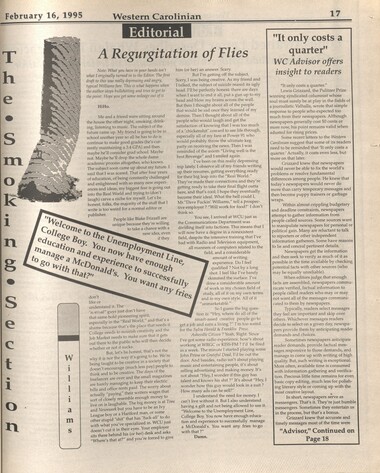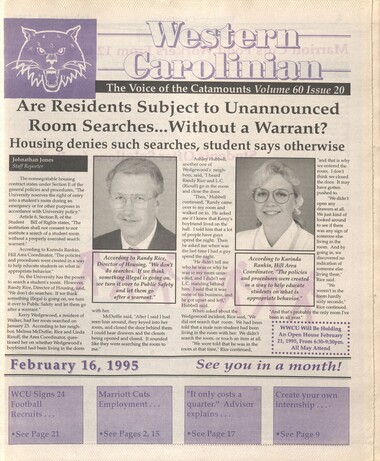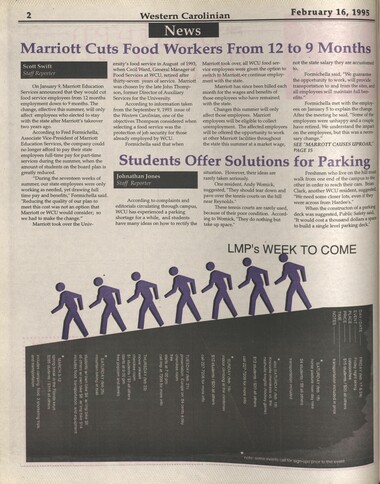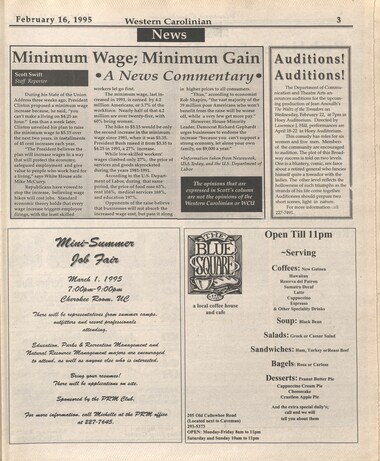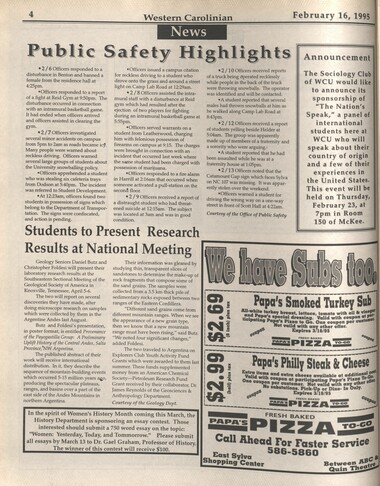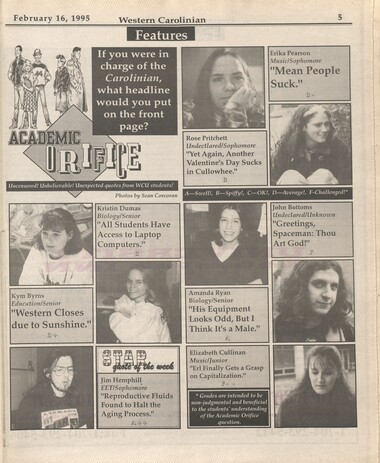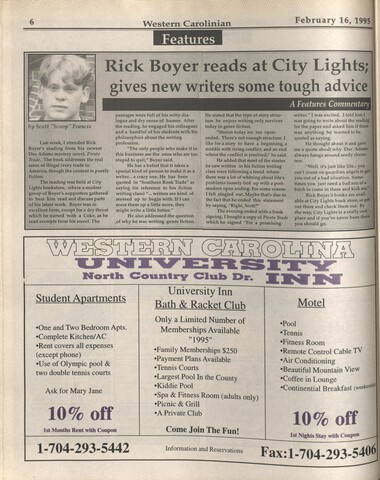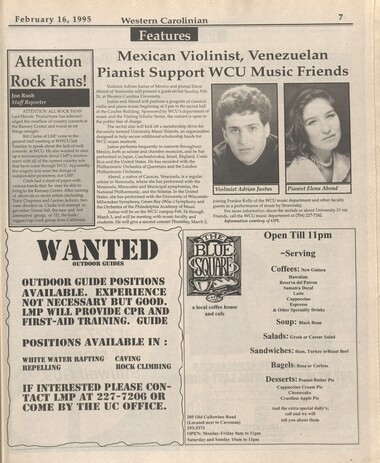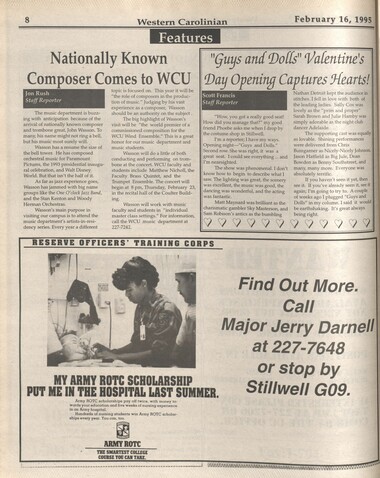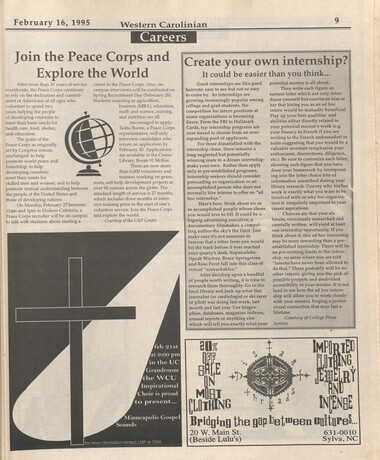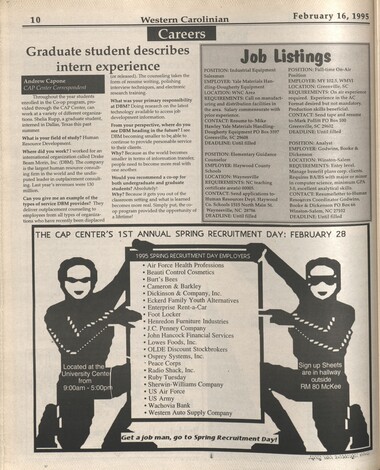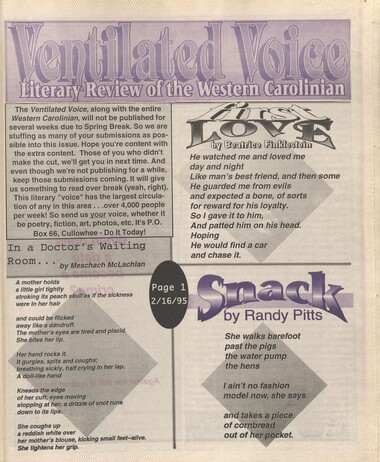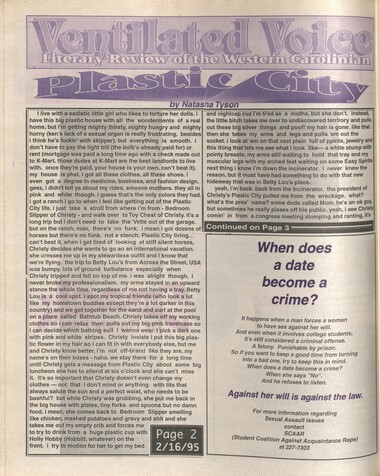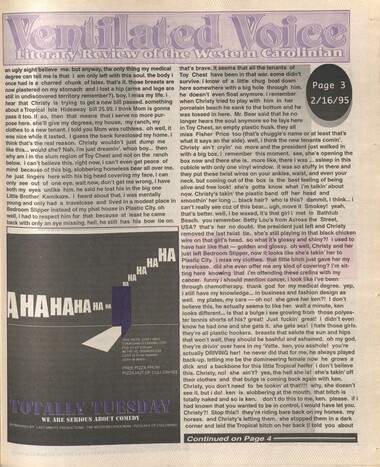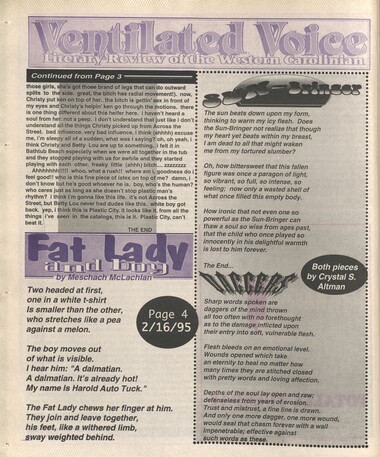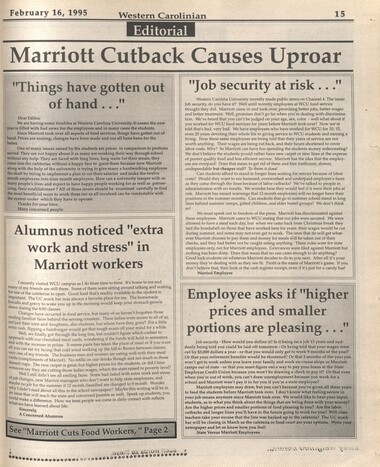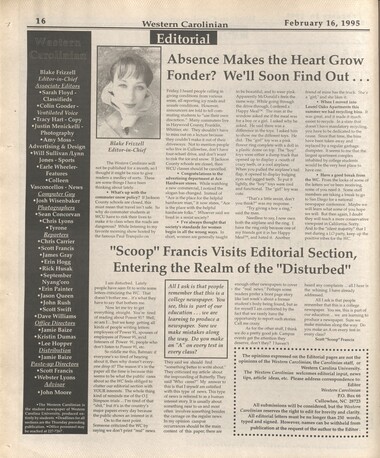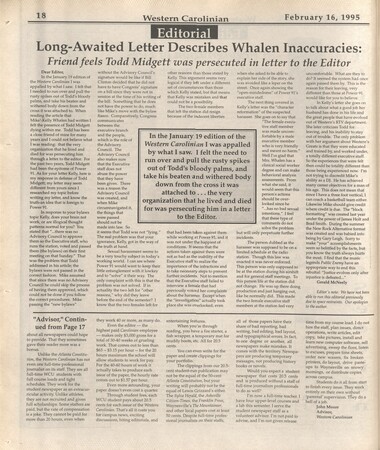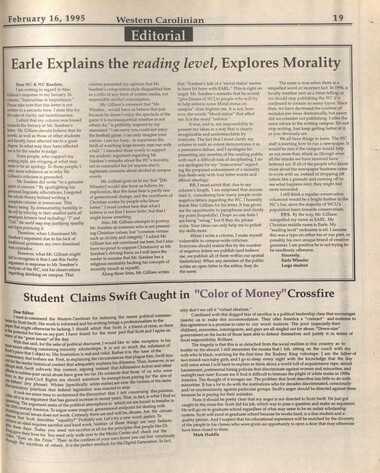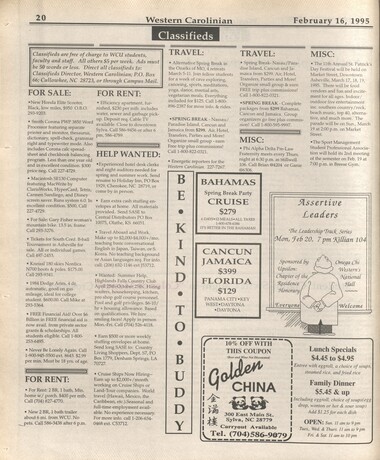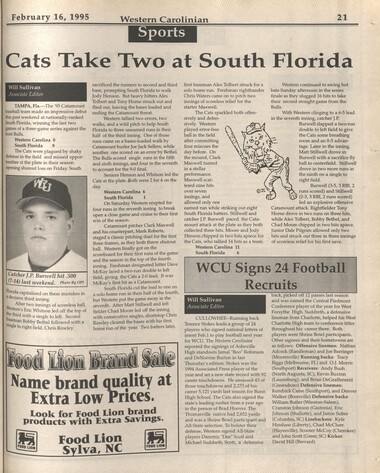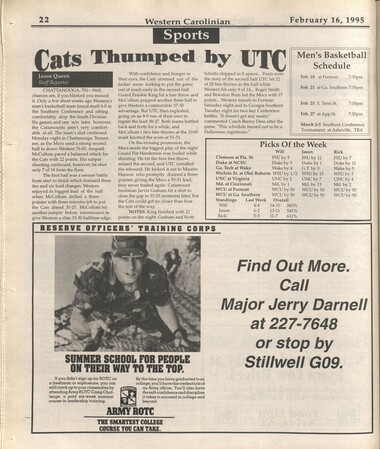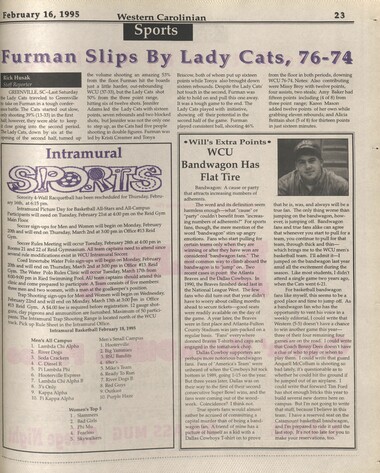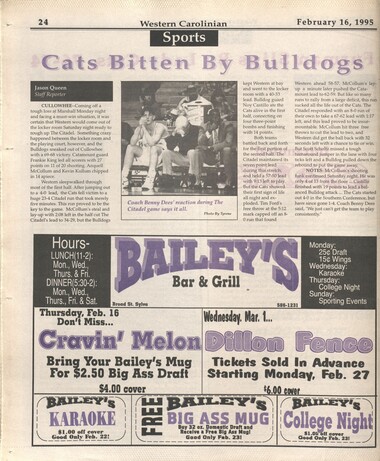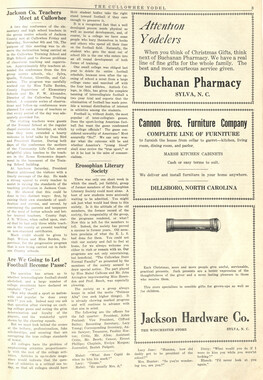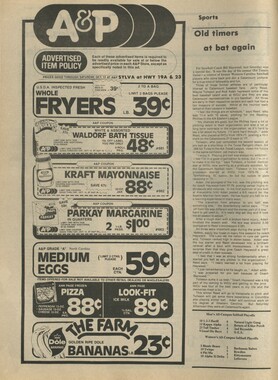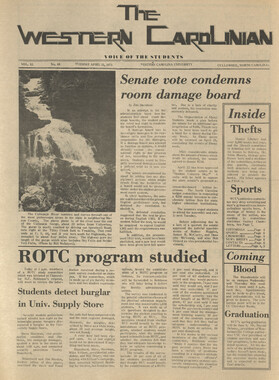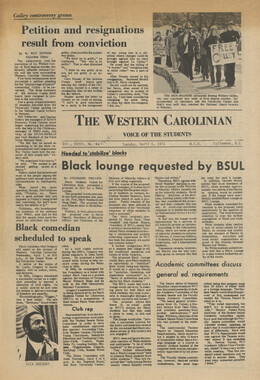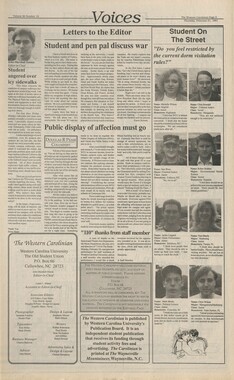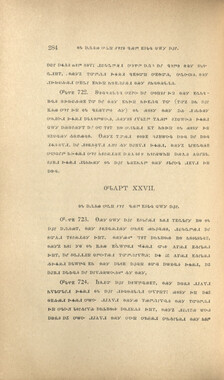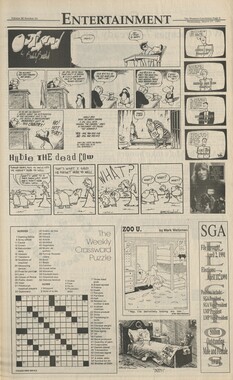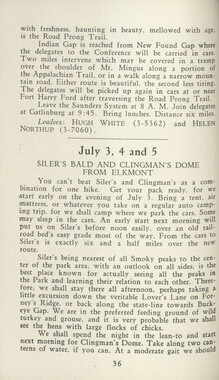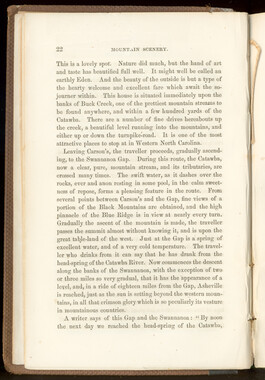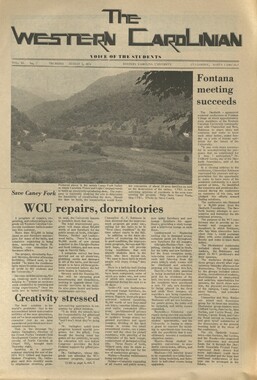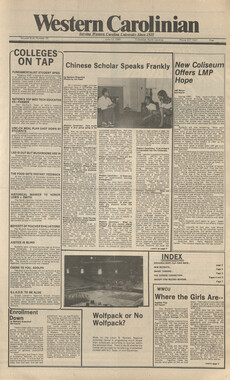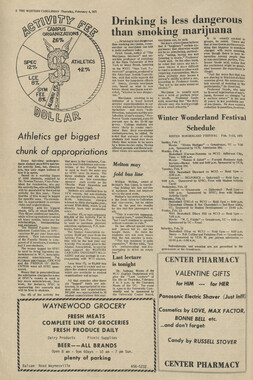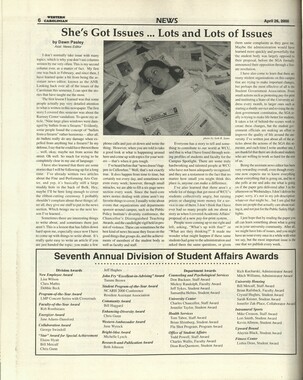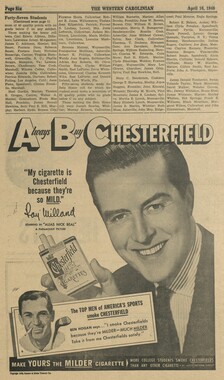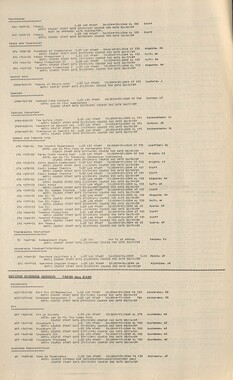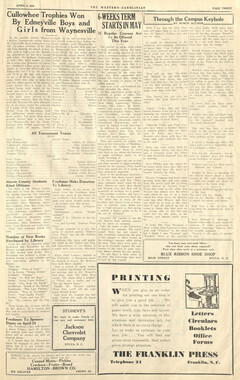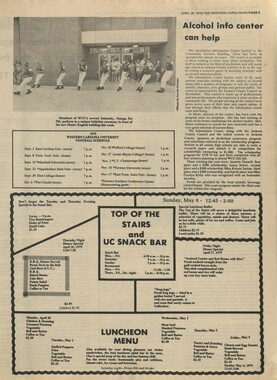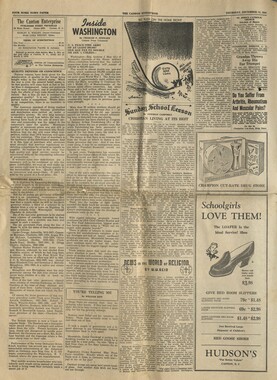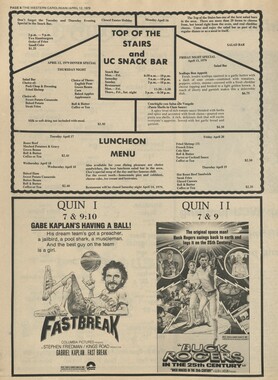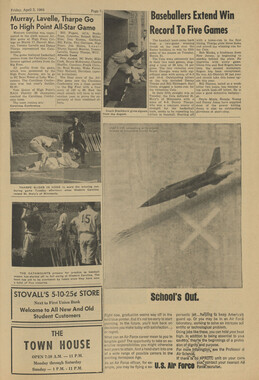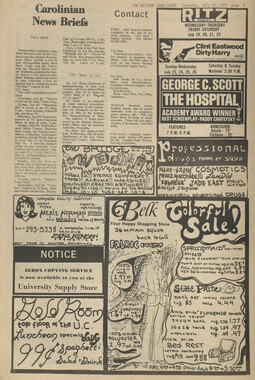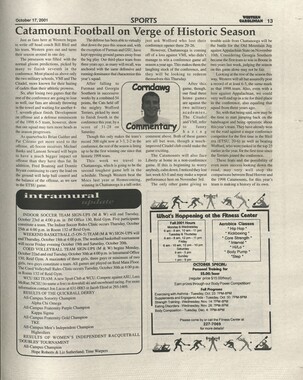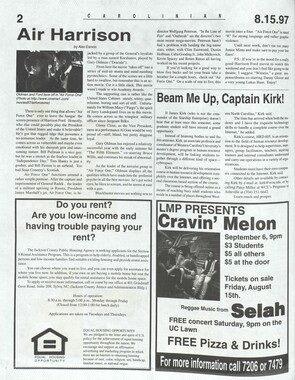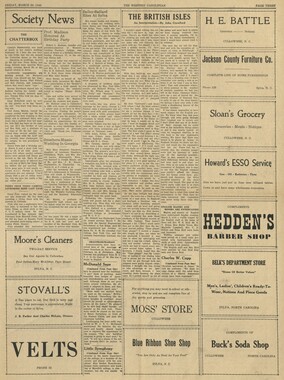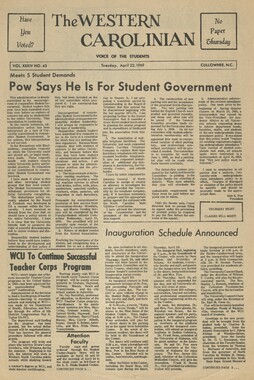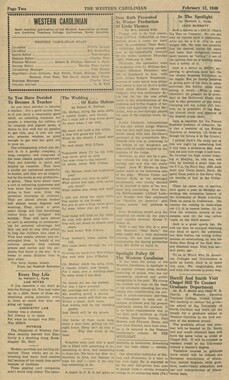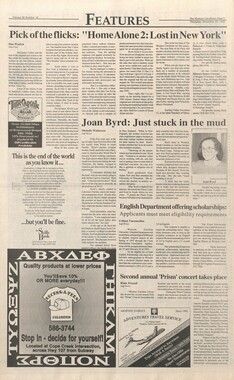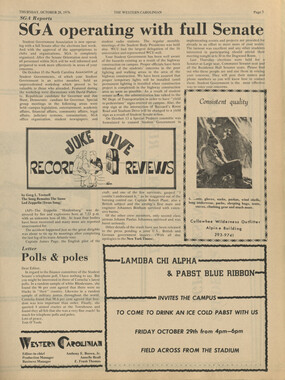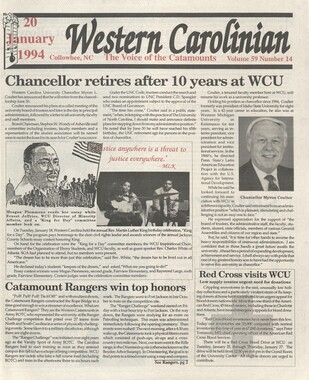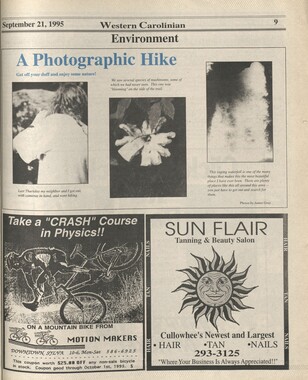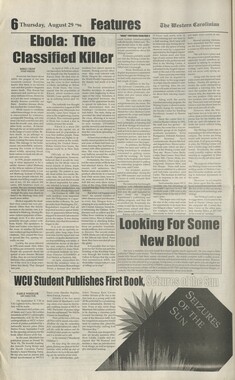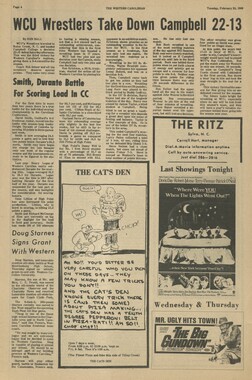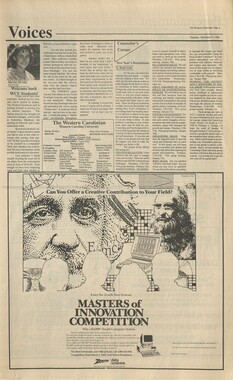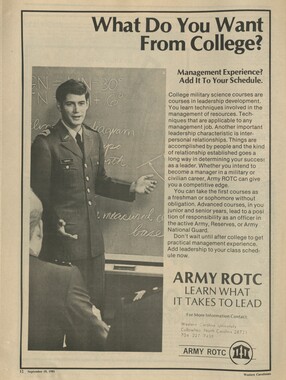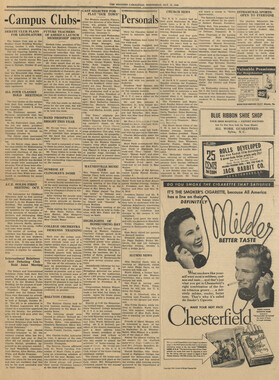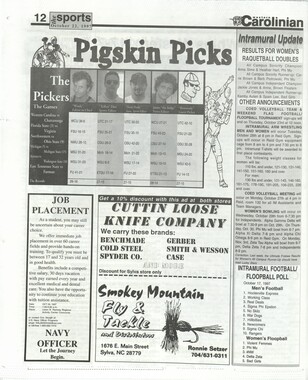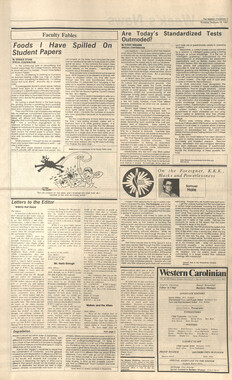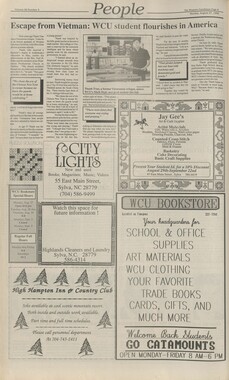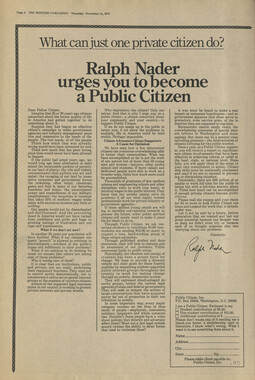Western Carolina University (20)
View all
- Canton Champion Fibre Company (2308)
- Cherokee Traditions (293)
- Civil War in Southern Appalachia (165)
- Craft Revival (1942)
- Great Smoky Mountains - A Park for America (2767)
- Highlights from Western Carolina University (430)
- Horace Kephart (941)
- Journeys Through Jackson (154)
- LGBTQIA+ Archive of Jackson County (26)
- Oral Histories of Western North Carolina (314)
- Picturing Appalachia (6772)
- Stories of Mountain Folk (413)
- Travel Western North Carolina (160)
- Western Carolina University Fine Art Museum Vitreograph Collection (129)
- Western Carolina University Herbarium (92)
- Western Carolina University: Making Memories (708)
- Western Carolina University Publications (2283)
- Western Carolina University Restricted Electronic Theses and Dissertations (146)
- Western North Carolina Regional Maps (71)
- World War II in Southern Appalachia (131)
University of North Carolina Asheville (6)
View all
- Allanstand Cottage Industries (62)
- Appalachian National Park Association (53)
- Bennett, Kelly, 1890-1974 (1388)
- Berry, Walter (76)
- Brasstown Carvers (40)
- Carver, George Washington, 1864?-1943 (26)
- Cathey, Joseph, 1803-1874 (1)
- Champion Fibre Company (233)
- Champion Paper and Fibre Company (297)
- Cherokee Indian Fair Association (16)
- Cherokee Language Program (22)
- Crowe, Amanda (40)
- Edmonston, Thomas Benton, 1842-1907 (7)
- Ensley, A. L. (Abraham Lincoln), 1865-1948 (275)
- Fromer, Irving Rhodes, 1913-1994 (70)
- George Butz (BFS 1907) (46)
- Goodrich, Frances Louisa (120)
- Grant, George Alexander, 1891-1964 (96)
- Heard, Marian Gladys (60)
- Kephart, Calvin, 1883-1969 (15)
- Kephart, Horace, 1862-1931 (313)
- Kephart, Laura, 1862-1954 (39)
- Laney, Gideon Thomas, 1889-1976 (439)
- Masa, George, 1881-1933 (61)
- McElhinney, William Julian, 1896-1953 (44)
- Niggli, Josephina, 1910-1983 (10)
- North Carolina Park Commission (105)
- Osborne, Kezia Stradley (9)
- Owens, Samuel Robert, 1918-1995 (11)
- Penland Weavers and Potters (36)
- Roberts, Vivienne (15)
- Roth, Albert, 1890-1974 (142)
- Schenck, Carl Alwin, 1868-1955 (1)
- Sherrill's Photography Studio (2565)
- Southern Highland Handicraft Guild (127)
- Southern Highlanders, Inc. (71)
- Stalcup, Jesse Bryson (46)
- Stearns, I. K. (213)
- Thompson, James Edward, 1880-1976 (226)
- United States. Indian Arts and Crafts Board (130)
- USFS (683)
- Vance, Zebulon Baird, 1830-1894 (1)
- Weaver, Zebulon, 1872-1948 (58)
- Western Carolina College (230)
- Western Carolina Teachers College (282)
- Western Carolina University (1794)
- Western Carolina University. Mountain Heritage Center (18)
- Whitman, Walt, 1819-1892 (10)
- Wilburn, Hiram Coleman, 1880-1967 (73)
- Williams, Isadora (3)
- Cain, Doreyl Ammons (0)
- Crittenden, Lorraine (0)
- Rhodes, Judy (0)
- Smith, Edward Clark (0)
- Appalachian Region, Southern (2399)
- Asheville (N.C.) (1917)
- Avery County (N.C.) (26)
- Blount County (Tenn.) (161)
- Buncombe County (N.C.) (1671)
- Cherokee County (N.C.) (283)
- Clay County (N.C.) (555)
- Graham County (N.C.) (233)
- Great Smoky Mountains National Park (N.C. and Tenn.) (510)
- Haywood County (N.C.) (3522)
- Henderson County (N.C.) (70)
- Jackson County (N.C.) (4692)
- Knox County (Tenn.) (25)
- Knoxville (Tenn.) (12)
- Lake Santeetlah (N.C.) (10)
- Macon County (N.C.) (420)
- Madison County (N.C.) (211)
- McDowell County (N.C.) (39)
- Mitchell County (N.C.) (132)
- Polk County (N.C.) (35)
- Qualla Boundary (981)
- Rutherford County (N.C.) (76)
- Swain County (N.C.) (2113)
- Transylvania County (N.C.) (247)
- Watauga County (N.C.) (12)
- Waynesville (N.C.) (73)
- Yancey County (N.C.) (72)
- Aerial Photographs (3)
- Aerial Views (60)
- Albums (books) (4)
- Articles (1)
- Artifacts (object Genre) (228)
- Bibliographies (1)
- Biography (general Genre) (2)
- Cards (information Artifacts) (38)
- Clippings (information Artifacts) (191)
- Crafts (art Genres) (622)
- Depictions (visual Works) (21)
- Design Drawings (1)
- Drawings (visual Works) (184)
- Envelopes (73)
- Facsimiles (reproductions) (1)
- Fiction (general Genre) (4)
- Financial Records (12)
- Fliers (printed Matter) (67)
- Glass Plate Negatives (381)
- Guidebooks (2)
- Internegatives (10)
- Interviews (812)
- Land Surveys (102)
- Letters (correspondence) (1013)
- Manuscripts (documents) (619)
- Maps (documents) (177)
- Memorandums (25)
- Minutes (administrative Records) (59)
- Negatives (photographs) (5835)
- Newsletters (1285)
- Newspapers (2)
- Occupation Currency (1)
- Paintings (visual Works) (1)
- Pen And Ink Drawings (1)
- Periodicals (193)
- Personal Narratives (10)
- Photographs (12976)
- Plans (maps) (1)
- Poetry (7)
- Portraits (1960)
- Postcards (329)
- Programs (documents) (151)
- Publications (documents) (2237)
- Questionnaires (65)
- Scrapbooks (282)
- Sheet Music (2)
- Slides (photographs) (402)
- Songs (musical Compositions) (2)
- Sound Recordings (796)
- Specimens (92)
- Speeches (documents) (15)
- Tintypes (photographs) (8)
- Transcripts (322)
- Video Recordings (physical Artifacts) (23)
- Vitreographs (129)
- Text Messages (0)
- A.L. Ensley Collection (275)
- Appalachian Industrial School Records (7)
- Appalachian National Park Association Records (336)
- Axley-Meroney Collection (2)
- Bayard Wootten Photograph Collection (20)
- Bethel Rural Community Organization Collection (7)
- Blumer Collection (5)
- C.W. Slagle Collection (20)
- Canton Area Historical Museum (2110)
- Carlos C. Campbell Collection (282)
- Cataloochee History Project (65)
- Cherokee Studies Collection (4)
- Daisy Dame Photograph Album (5)
- Daniel Boone VI Collection (1)
- Doris Ulmann Photograph Collection (112)
- Elizabeth H. Lasley Collection (1)
- Elizabeth Woolworth Szold Fleharty Collection (4)
- Frank Fry Collection (95)
- George Masa Collection (173)
- Gideon Laney Collection (452)
- Hazel Scarborough Collection (2)
- Hiram C. Wilburn Papers (28)
- Historic Photographs Collection (236)
- Horace Kephart Collection (861)
- Humbard Collection (33)
- Hunter and Weaver Families Collection (1)
- I. D. Blumenthal Collection (4)
- Isadora Williams Collection (4)
- Jesse Bryson Stalcup Collection (47)
- Jim Thompson Collection (224)
- John B. Battle Collection (7)
- John C. Campbell Folk School Records (80)
- John Parris Collection (6)
- Judaculla Rock project (2)
- Kelly Bennett Collection (1407)
- Love Family Papers (11)
- Major Wiley Parris Civil War Letters (3)
- Map Collection (12)
- McFee-Misemer Civil War Letters (34)
- Mountain Heritage Center Collection (4)
- Norburn - Robertson - Thomson Families Collection (44)
- Pauline Hood Collection (7)
- Pre-Guild Collection (2)
- Qualla Arts and Crafts Mutual Collection (12)
- R.A. Romanes Collection (681)
- Rosser H. Taylor Collection (1)
- Samuel Robert Owens Collection (94)
- Sara Madison Collection (144)
- Sherrill Studio Photo Collection (2558)
- Smoky Mountains Hiking Club Collection (616)
- Stories of Mountain Folk - Radio Programs (374)
- The Reporter, Western Carolina University (510)
- Venoy and Elizabeth Reed Collection (16)
- WCU Gender and Sexuality Oral History Project (32)
- WCU Mountain Heritage Center Oral Histories (25)
- WCU Oral History Collection - Mountain People, Mountain Lives (71)
- WCU Students Newspapers Collection (1744)
- Western North Carolina Tomorrow Black Oral History Project (69)
- William Williams Stringfield Collection (2)
- Zebulon Weaver Collection (109)
- African Americans (390)
- Appalachian Trail (35)
- Artisans (521)
- Cherokee art (84)
- Cherokee artists -- North Carolina (10)
- Cherokee language (21)
- Cherokee pottery (101)
- Cherokee women (208)
- Church buildings (167)
- Civilian Conservation Corps (U.S.) (110)
- College student newspapers and periodicals (1830)
- Dams (103)
- Dance (1023)
- Education (222)
- Floods (61)
- Folk music (1015)
- Forced removal, 1813-1903 (2)
- Forest conservation (220)
- Forests and forestry (1058)
- Gender nonconformity (4)
- Great Smoky Mountains National Park (N.C. and Tenn.) (181)
- Hunting (38)
- Landscape photography (10)
- Logging (103)
- Maps (84)
- Mines and mineral resources (8)
- North Carolina -- Maps (18)
- Paper industry (38)
- Postcards (255)
- Pottery (135)
- Railroad trains (71)
- Rural electrification -- North Carolina, Western (3)
- School integration -- Southern States (2)
- Segregation -- North Carolina, Western (5)
- Slavery (5)
- Sports (452)
- Storytelling (245)
- Waterfalls -- Great Smoky Mountains (N.C. and Tenn.) (66)
- Weaving -- Appalachian Region, Southern (280)
- Wood-carving -- Appalachian Region, Southern (328)
- World War, 1939-1945 (173)
Western Carolinian Volume 60 Number 20
Item
Item’s are ‘child’ level descriptions to ‘parent’ objects, (e.g. one page of a whole book).
-
-
February 16, 1995 Western Carolinian 1 Editorial A Regurgitation of Flies Note: What you have in your hands isn't what I originally turned in to the Editor. The first draft to this was really depressing and angry, typical Williams fare. This is what happens when the author stops bullshitting and tries to get to the point. Hope you get some mileage out of it. HiHo. Me and a friend were sitting around the house the other night, smoking, drinking, listening to music. The subject of the future came up. My friend is going to be in school another year so all he has to do is continue to make good grades (he's currently maintaining a 3.4 GPA) and then maybe he'll consider grad school. Maybe not. Maybe he'll drop the whole damn academic process altogether, who knows. The subject soon came up about my future. I said that I was scared. That after four years of education, of being constantly challenged and enlightened with so many new experiences and ideas, my biggest fear is going out into the Real World and trying to (don't laugh) carve a niche for myself. Let's be honest, folks, the majority of the stuff that I write is too weird for a normal editor or publisher. People like Blake Frizzell are unique because they're willing to take a chance with a new idea, even if they s e c t i o n don't like or understand it. The n.'rr.ial" guys just don't have that same bold pioneering spirit, especially in the "Real World," and that's a shame because that's the place that needs it. College needs to nourish creativity and the Job Market needs to make sure that it gets out there to the public who will then decide whether or not it sucks. But, let's be honest, that's not the way it is nor'the way it's-going to be. We're being taught to be creative in a society that doesn't encourage (much less pay) people to think and to be creative. The days of the freelancer are over and the small magazines are barely managing to keep their electric bills and office rents paid. The worry about actually "paying" their writers wages that sort of closely resemble enough money to live on is laughable. The big money is at Time and Newsiveek but you have to be an Ivy League boy or a Hartford man or some other stupid "shit" that has "fuck-allito do with what you've specialized in. WCU ,ust doesn't cut it in their eyes. Your employer sits there behind his (or her) desk and asks "Where's that at?" and you're forced to give him (or her) an answer. Scary. But I'm getting off the subject. Sorry, I was being creative. As my friend and I talked, the subject of suicide reared its ugly head. I'll be perfectly honest; there are days when I want to end it all, put a gun up to my head and blow my brains across the wall. But then I thought about all of the people that would be sad once they learned of my demise. Then I thought about all of the people who would laugh and get the satisfaction of knowing that 1 was too much of a "chickenshit" coward to see life through, especially all of my fans at Power 91 who would probably throw the ultimate keg party on receiving the news. Then I was reminded of the axiom "Living well is the best Revenge" and I smiled again. I've been on this really depressing trip lately. 1 observe all of my friends writing up their resumes, getting everything ready for their big leap into the "Real World." They've made their connections and they're getting ready to take their final flight outta here, and that's cool; I hope they eventually become their ideal. What the hell could I, Mr."Dave Fuckin' Williams," tell a prospective employer ? "Will work for food?" I don't think so. You see, I arrived at WCU just as the Communications Department was dividing itself into factions. This means that I will now have a degree in a nonexistent field, despite the intensive training that I've had with Radio and Television equipment, all manners of computers related to the field, and a considerable amount of writing experience. Do I feel qualified ? Not by a long shot. I feel like I've barely skimmed the surface. I've done a considerable amount of work in my chosen field of study, all of it on my own terms and in my own style. All of it 'unmarketable." So I guess the big question is: "Hey, where do all of the smart-assed creative people go to get a job and earn a living ?" I'm too weird for the Sylva Herald & Franklin Press. Asheville Citizen ? Yeah, Right. Since I've got some radio experience, how's about working at WRGC or KISS-FM ? I'd be fired in a week. The minute I started playing some John Prine or Grateful Dead, I'd be out the door. And besides, radio isn't about playing music and entertaining people, it's about selling advertising and making money. It's not about "Hey, I wonder if this guy has talent and knows his shit ?" It's about "Hey, I wonder how this guy would look in a suit ? How many ads can he sell?" I understand the need for money. I can't live without it. But I also understand having a gift and not being allowed to use it. "Welcome to the Unemployment Line, College Boy. You now have enough education and experience to successfully manage a McDonald's. You want any fries to go with that ?" Damn. "It only costs a quarter" WC Advisor offers insight to readers "It only costs a quarter." Lewis Grizzard, the Pulitzer Prize winning syndicated columnist whose soul must surely be at play in the fields of a journalistic Valhalla, wrote that simple response to people who expected too much from their newspapers. Although newspapers generally cost 50 cents or more now, his point remains valid when adusted for rising prices. Some recent letters to the Western Carolinian suggest that some of its readers need to be reminded that 'It only costs a quarter.' Actually, it costs even less, but more on that later. Grizzard knew that newspapers would never be able to fix the world's problems or resolve fundamental differences among people. He knew that today's newspapers would never do more than carry temporary messages and then become puppy trainers or garbage wraps. Within almost crippling budgetary and deadline constraints, newspapers attempt to gather information from people called sources. Some sources want to manipulate newspapers for personal or political gain. Many are reluctant to talk to reporters or other independent information gatherers. Some have reasons to lie and conceal pertinent details. Newspapers get the information and then seek to verify as much of it as possible in the time available by checking potential facts with other sources (who may be equally unreliable). When editors judge that enough facts are assembled, newspapers communicate verified, factual information to people called readers who may or may not want all of the messages communicated to them by newspapers. Typically, readers select messages they feel are important and skip over others. Whichever messages readers decide to select on a given day, newspapers provide them by anticipating reader demands and choices. Sometimes newspapers anticipate reader demands, provide factual messages responsive to those demands, and manage to come up with writing of high quality. But, such writing is exceptional. More often, available time is consumed with information gathering and verification. Precious little time remains for even basic copy editing, much less for polishing literary style or coming up with the most creative layout. In short, newspapers serve as messengers. That's it. They're just humble messengers. Sometimes they entertain us in the process, but that's a bonus. Grizzard knew that accurate and timely messages most of the time were "Advisor," Continued on Page 18
Object
Object’s are ‘parent’ level descriptions to ‘children’ items, (e.g. a book with pages).
-
The Western Carolinian is Western Carolina University's student-run newspaper. The paper was published as the Cullowhee Yodel from 1924 to 1931 before changing its name to The Western Carolinian in 1933.
-
